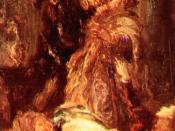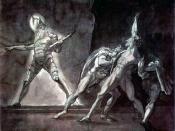In William Shakespeare's play Hamlet, the concept of cultural identity is explored through Hamlet's isolation which is created by the conflict between his duty to his father, and his duties to the monarchy and society. Hamlet is isolated from his society due to his turbulent emotions which result from his indecision on how to respond to his father's murder. Hamlet's duty as a son is to avenge his father's death and he would be supported in his actions by society if the murderer was believed to be guilty. Hamlet's duty as a citizen and a Prince is to protect the King and to ensure stability in the monarchy. In order for Hamlet to revenge his father he would have to kill the King which creates a conflict between his two primary duties. Because of this, Hamlet finds it difficult to decide how to proceed and which duty takes precedence, and Hamlet decides to gather evidence as proof of Claudius' guilt so that his revenge is justified to society and to himself.
The 'unholiness' of murdering a king who is also a close relative is highlighted by Claudius and this allows the audience to better understand the conflict and the indecision facing Hamlet.
Hamlet's duty as a son, in his social context and circumstances, is one which encourages him to seek revenge for his murdered father. For Hamlet to be perceived as a noble and worthy son, he would have to kill his father's murderer, and his actions would be supported by society as long as the murderer was believed to be guilty. In Hamlet's first soliloquy after the encounter with the ghost early in the play, when the ghost tells him that he must seek revenge, Hamlet quickly acknowledges his duty as a son.
Hamlet: I'll wipe away all trivial...


